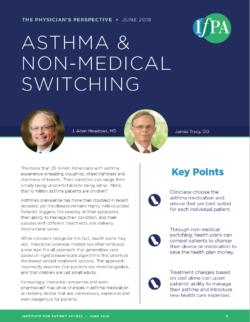 Treating asthma is not a one-size-fits-all exercise, as patients and clinicians well know. So why do some health plan policies suggest otherwise? The question drives a new policy brief from the Institute for Patient Access.
Treating asthma is not a one-size-fits-all exercise, as patients and clinicians well know. So why do some health plan policies suggest otherwise? The question drives a new policy brief from the Institute for Patient Access.
Authored by J. Allen Meadows, MD, and James Tracy, DO, the paper explores how non-medical switching undermines clinical decisions about which medications and devices work best for individual patients. “Asthma and Non-Medical Switching” pinpoints two main inhaled asthma medications – anti-inflammatories, such as steroids, and bronchodilators, which open up the breathing passages. The paper also pinpoints three primary delivery devices: metered-dose inhalers, dry powder inhalers and nebulizers.
Which medication and device work best depends entirely upon the patient, say Drs. Meadows and Tracy. Nebulized medicine might be preferable for seniors or for children with severe asthma, they explain, while athletes or active young patients may adhere to treatment better with a portable dry powder inhaler. The authors note that patients often have strong preferences about their device.
“Like asthma medications,” the paper argues, “devices are neither equivalent nor interchangeable.” Nevertheless, non-medical switching policies drive asthma patients to change devices based on what’s less expensive for the insurer. This may occur when a health plan removes a certain device from its formulary of covered products, or when it moves the product to a non-preferred tier – increasing the out-of-pocket burden for the patient.
To understand how to use a new device, patients need to return to their health care provider for education. Not all will. Switching devices may also disrupt patients’ ability to manage their asthma, leading to more appointments or hospitalizations.
In fact, 2017 research from the Institute for Patient Access demonstrated that non-medical switching can lead to higher non-drug costs for certain chronic conditions – including asthma. Switches can also indicate a disrupted course of care; patients who switch once are more likely to switch again, increasing non-drug medical costs still further.
The ability to breathe is one of the most fundamental measures of health. And, for asthma patients, that ability is tied to whether they can access the medications and devices prescribed by their clinicians. Dr. Meadows and Dr. Tracy urge commonsense limits on health plans to protect the physician-patient relationship in asthma care and to ensure access to appropriate, individualized treatment for patients.
To learn more, read “Asthma & Non-Medical Switching.”

